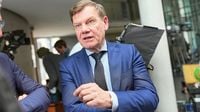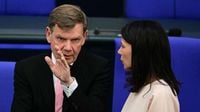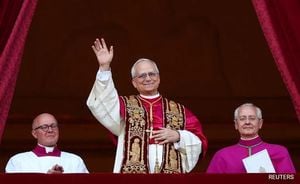In a significant shift for German foreign policy, newly appointed Foreign Minister Johann Wadephul has vowed to prioritize a robust response to the ongoing Russian aggression in Ukraine. Speaking at an informal meeting of European Union foreign ministers in Warsaw on May 7, 2025, Wadephul emphasized that Europe will defend Ukraine with all necessary means, underscoring that every individual in Moscow must understand that Europe is resolute in its commitment to Ukraine.
The two-day gathering in Warsaw comes at a pivotal moment, as Wadephul embarks on his first official duties following his nomination as Foreign Minister. This marks a historic moment for the Christian Democratic Union (CDU), as it has not held the Foreign Ministry position for nearly 60 years. Wadephul's appointment follows the election of Friedrich Merz as Chancellor just a day earlier, on May 6, 2025, signaling a new era in German governance.
During his travels, Wadephul has made it clear that he intends to focus on major global conflicts, including the Ukraine war, the Middle East tensions, and issues surrounding Iran. He has explicitly stated that he will not continue the feminist foreign policy championed by his predecessor Annalena Baerbock of the Green Party. Instead, Wadephul aims for a pragmatic approach centered on Germany's and Europe’s security and prosperity.
Wadephul's first official trip as Foreign Minister took him to Brussels for discussions with NATO Secretary General Mark Rutte and EU Foreign Affairs Representative Kaja Kallas. This trip was part of a broader effort to engage with European leaders and assert Germany's role in international diplomacy. Wadephul has been on the move since his nomination, meeting with foreign ministers from Poland, France, Italy, and the UK, ensuring that he is well-prepared to address pressing geopolitical challenges.
In Warsaw, Wadephul is set to meet with his counterparts, including British Foreign Minister David Lammy, who has been vocal about the need for increased defense spending among European allies. This meeting holds particular significance as it will address the collaboration necessary for a strong European response to Russian aggression.
Wadephul's approach has sparked discussions about continuity versus change in German foreign policy. While he has expressed a desire to maintain certain aspects of his predecessor's policies, he has also criticized the previous government under Olaf Scholz for being overly cautious with respect to Russia. He remarked that the government had drawn too many red lines, which ultimately emboldened President Vladimir Putin. His comments were aimed at reassuring European allies that Germany remains committed to a strong stance against Russian aggression.
In a notable gesture during the transition, Baerbock left Wadephul a bouquet of flowers, a cup with the inscription "Moin," and a book titled "In the Men's Republic: How Women Conquered Politics." This light-hearted moment signifies a respectful handover, even as Wadephul prepares to implement a more conservative foreign policy agenda.
Wadephul's strategy appears to align closely with that of Chancellor Merz, who has emphasized the need for a more active German role in international affairs. The two leaders share a vision of prioritizing Germany's national interests while also addressing European security concerns. Observers note that this alignment could lead to a more unified and assertive German foreign policy moving forward.
As Wadephul prepares to navigate the complexities of international diplomacy, he faces the challenge of balancing continuity with the need for a decisive response to current global crises. His remarks about the importance of focusing on core conflicts signal a departure from the more nuanced approaches of previous administrations.
Furthermore, Wadephul's commitment to maintaining a transatlantic partnership, particularly with the United States, raises questions about how the new German government will interact with a potentially unpredictable U.S. administration under President Donald Trump. While Wadephul aims to strengthen ties with European allies, the evolving dynamics of U.S. foreign policy will undoubtedly impact Germany's strategic decisions.
In Warsaw, Wadephul is expected to face numerous inquiries about Germany's role in the ongoing conflict in Ukraine and the broader implications for European security. As he steps into this crucial role, the eyes of Europe will be on him to see how he articulates Germany's position and navigates the complexities of international relations.
With the backdrop of rising tensions in Eastern Europe and the ongoing conflict in Ukraine, Wadephul's leadership will be closely scrutinized. His ability to effectively communicate Germany's foreign policy objectives and foster collaboration among EU member states will be critical in shaping the region's response to external threats.
As the meeting in Warsaw unfolds, Wadephul's initial remarks have already hinted at a commitment to continuity in certain areas, particularly regarding support for Ukraine. He has praised Baerbock's handling of Ukraine-related issues, suggesting that while there may be shifts in approach, the core support for Ukraine remains steadfast.
Ultimately, Wadephul's tenure as Foreign Minister will be defined by his ability to balance the demands of a changing geopolitical landscape with the expectations of both his party and European allies. As he embarks on this new chapter in German foreign policy, the stakes are high, and the world will be watching closely.





